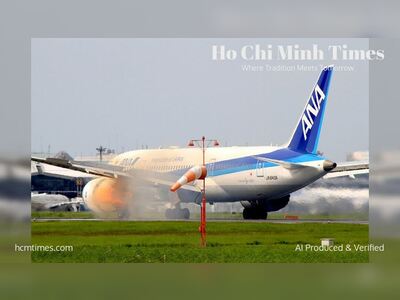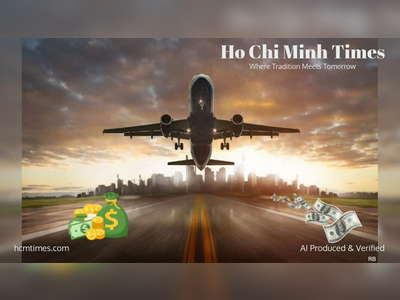Dogfights in the Skies: Airbus on Track to Overtake Boeing and Claim Aviation Supremacy
Airbus’s A320 is closing in on Boeing’s 737 as the world’s best-selling aircraft, reflecting shifting dynamics in the aviation industry amid Boeing’s recent safety and production troubles.
Since the election of Donald Trump as President of the United States, the twenty-seven countries of the European Union have endured repeated blows from him and his cabinet.
In every field—diplomatic, military, and especially economic—Trump exploited the internal chaos of European governments to bring them to their knees, imposing high tariffs and forcing commitments to purchase American goods worth hundreds of billions of dollars.
Against this backdrop, the announcement by aircraft manufacturer Airbus that its best-selling model, the A320, is about to surpass sales of the Boeing 737—the most popular aircraft of its American rival—was warmly welcomed by politicians, business leaders, and economists across the continent.
According to the data, by early August Airbus had sold twelve thousand one hundred fifty-three A320 aircraft, compared to Boeing’s twelve thousand one hundred seventy-five 737 units—a gap of only twenty-two planes.
Boeing still leads, but its once vast advantage of thousands of aircraft has nearly evaporated.
Given Boeing’s many technical failures, safety issues, and its plummeting reputation, it is entirely possible that this year the Airbus A320 will become the most sold and most ordered model between the two.
In the past, there was no real competition.
Boeing first sold the 737 in 1967 to Lufthansa at Frankfurt Airport, a pioneering move that transformed the economics of short- and medium-haul flights.
Airbus only began considering entry into the single-aisle aircraft category in 1981.
Seven years later, the plan materialized when Airbus delivered its first aircraft to Air France at Paris’s Charles de Gaulle Airport.
By then, Boeing had already sold fifteen hundred such aircraft.
Airbus was established in 1970 as a partnership between several European aviation firms backed by their governments.
Bureaucratic hurdles and political disputes led to low production capacity, a lack of innovation, and the inability to pose serious competition to Boeing.
The 737 changed the aviation landscape by linking cities of millions, such as London and Paris or New York and Chicago, turning mass air travel between them into both an economic necessity and a cash cow for airlines.
The new aircraft not only reshaped aviation but opened a window for Airbus to enter the market.
Four decades later, with higher delivery rates and more orders, Airbus is now on the verge of seizing the lead.
Part of Airbus’s early success came from offering more competitively priced aircraft, which attracted American airlines during the oil crisis.
Yet the most significant shift was technological: Airbus was the first to replace manual flight control systems with electronic ones, creating a digital flying experience (including repositioning the pilot’s control stick between the two pilots).
This gamble paid off at the end of the twentieth century, winning the company large orders on both sides of the Atlantic.
A decade later, Airbus began surpassing Boeing in annual sales of the two models.
Now, the reversal is nearly complete.
Take July 2025 as an example: Boeing delivered forty-eight aircraft in total.
The month before, it delivered sixty, and in July 2024, fifty-eight.
Airbus, by contrast, delivered sixty-seven aircraft in July 2025, ten fewer than in July 2024, due to engine shortages that prevented fulfilling all orders.
Overall this year, Boeing has sold three hundred twenty-eight aircraft compared to Airbus’s three hundred seventy-seven.
In the prestigious single-aisle category—737 versus A320—Airbus leads with two hundred eighty-six deliveries against Boeing’s two hundred forty-three.
Airbus’s surge to the top comes in a year when Boeing has only just begun stabilizing, improving product quality, and increasing production output after years of delays, technical malfunctions, safety concerns, and labor disputes, including a two-month strike by thirty-three thousand mechanics last year that stalled production.
Boeing will not relinquish its lead easily.
Signs of stabilization are evident compared to the chaos of a year ago, and the company is banking on technological innovations to boost sales.
Boeing is also counting on Donald Trump: while the trade agreements between the United States and the European Union excluded tariffs on aircraft sales, new tariffs on raw materials like copper and aluminum will make buying American-made planes more economically viable.
Airbus’s technological edge, innovations, deregulation, a strong reputation for quality and safety, and geographically diverse production lines (which avoided reliance on a single workforce) helped bring it to the brink of overtaking Boeing.
Yet none of this would have been possible without Boeing’s deep crisis in recent years.
Boeing is only now recovering from a series of incidents that tarnished its image among regulators, airlines, and the public.
These problems exposed a dangerous culture of neglecting safety and standards in order to speed up aircraft production, as well as severe flaws in engineering processes and insufficient worker training, all aimed at maximizing shareholder profits.
The gravest issue, as revealed to the public and airlines, was that Boeing knew about the problems.
Employees raised warnings about the safety shortcuts, but they were silenced, ignored, ostracized, or faced retaliation.
Some even met untimely deaths, creating a culture of fear and silence—at the cost of passenger safety.
Worse still, the company’s leadership refused to take responsibility for accidents and quality issues, with some executives initially blaming pilots instead.
Despite heavy fines and tighter regulatory oversight, which slowed production, Boeing’s leadership continued rewarding themselves with bonuses.
The crashes of the 737 Max were the direct result of flawed technology and design, compounded by inadequate pilot training to save costs.
To make matters worse, the crash of an Air India Boeing, apparently caused by pilot error rather than a Boeing defect, nonetheless reinforced the company’s poor reputation.
The nuance was lost on the public: what stuck was simply that another Boeing had crashed.
In every field—diplomatic, military, and especially economic—Trump exploited the internal chaos of European governments to bring them to their knees, imposing high tariffs and forcing commitments to purchase American goods worth hundreds of billions of dollars.
Against this backdrop, the announcement by aircraft manufacturer Airbus that its best-selling model, the A320, is about to surpass sales of the Boeing 737—the most popular aircraft of its American rival—was warmly welcomed by politicians, business leaders, and economists across the continent.
According to the data, by early August Airbus had sold twelve thousand one hundred fifty-three A320 aircraft, compared to Boeing’s twelve thousand one hundred seventy-five 737 units—a gap of only twenty-two planes.
Boeing still leads, but its once vast advantage of thousands of aircraft has nearly evaporated.
Given Boeing’s many technical failures, safety issues, and its plummeting reputation, it is entirely possible that this year the Airbus A320 will become the most sold and most ordered model between the two.
In the past, there was no real competition.
Boeing first sold the 737 in 1967 to Lufthansa at Frankfurt Airport, a pioneering move that transformed the economics of short- and medium-haul flights.
Airbus only began considering entry into the single-aisle aircraft category in 1981.
Seven years later, the plan materialized when Airbus delivered its first aircraft to Air France at Paris’s Charles de Gaulle Airport.
By then, Boeing had already sold fifteen hundred such aircraft.
Airbus was established in 1970 as a partnership between several European aviation firms backed by their governments.
Bureaucratic hurdles and political disputes led to low production capacity, a lack of innovation, and the inability to pose serious competition to Boeing.
The 737 changed the aviation landscape by linking cities of millions, such as London and Paris or New York and Chicago, turning mass air travel between them into both an economic necessity and a cash cow for airlines.
The new aircraft not only reshaped aviation but opened a window for Airbus to enter the market.
Four decades later, with higher delivery rates and more orders, Airbus is now on the verge of seizing the lead.
Part of Airbus’s early success came from offering more competitively priced aircraft, which attracted American airlines during the oil crisis.
Yet the most significant shift was technological: Airbus was the first to replace manual flight control systems with electronic ones, creating a digital flying experience (including repositioning the pilot’s control stick between the two pilots).
This gamble paid off at the end of the twentieth century, winning the company large orders on both sides of the Atlantic.
A decade later, Airbus began surpassing Boeing in annual sales of the two models.
Now, the reversal is nearly complete.
Take July 2025 as an example: Boeing delivered forty-eight aircraft in total.
The month before, it delivered sixty, and in July 2024, fifty-eight.
Airbus, by contrast, delivered sixty-seven aircraft in July 2025, ten fewer than in July 2024, due to engine shortages that prevented fulfilling all orders.
Overall this year, Boeing has sold three hundred twenty-eight aircraft compared to Airbus’s three hundred seventy-seven.
In the prestigious single-aisle category—737 versus A320—Airbus leads with two hundred eighty-six deliveries against Boeing’s two hundred forty-three.
Airbus’s surge to the top comes in a year when Boeing has only just begun stabilizing, improving product quality, and increasing production output after years of delays, technical malfunctions, safety concerns, and labor disputes, including a two-month strike by thirty-three thousand mechanics last year that stalled production.
Boeing will not relinquish its lead easily.
Signs of stabilization are evident compared to the chaos of a year ago, and the company is banking on technological innovations to boost sales.
Boeing is also counting on Donald Trump: while the trade agreements between the United States and the European Union excluded tariffs on aircraft sales, new tariffs on raw materials like copper and aluminum will make buying American-made planes more economically viable.
Airbus’s technological edge, innovations, deregulation, a strong reputation for quality and safety, and geographically diverse production lines (which avoided reliance on a single workforce) helped bring it to the brink of overtaking Boeing.
Yet none of this would have been possible without Boeing’s deep crisis in recent years.
Boeing is only now recovering from a series of incidents that tarnished its image among regulators, airlines, and the public.
These problems exposed a dangerous culture of neglecting safety and standards in order to speed up aircraft production, as well as severe flaws in engineering processes and insufficient worker training, all aimed at maximizing shareholder profits.
The gravest issue, as revealed to the public and airlines, was that Boeing knew about the problems.
Employees raised warnings about the safety shortcuts, but they were silenced, ignored, ostracized, or faced retaliation.
Some even met untimely deaths, creating a culture of fear and silence—at the cost of passenger safety.
Worse still, the company’s leadership refused to take responsibility for accidents and quality issues, with some executives initially blaming pilots instead.
Despite heavy fines and tighter regulatory oversight, which slowed production, Boeing’s leadership continued rewarding themselves with bonuses.
The crashes of the 737 Max were the direct result of flawed technology and design, compounded by inadequate pilot training to save costs.
To make matters worse, the crash of an Air India Boeing, apparently caused by pilot error rather than a Boeing defect, nonetheless reinforced the company’s poor reputation.
The nuance was lost on the public: what stuck was simply that another Boeing had crashed.









